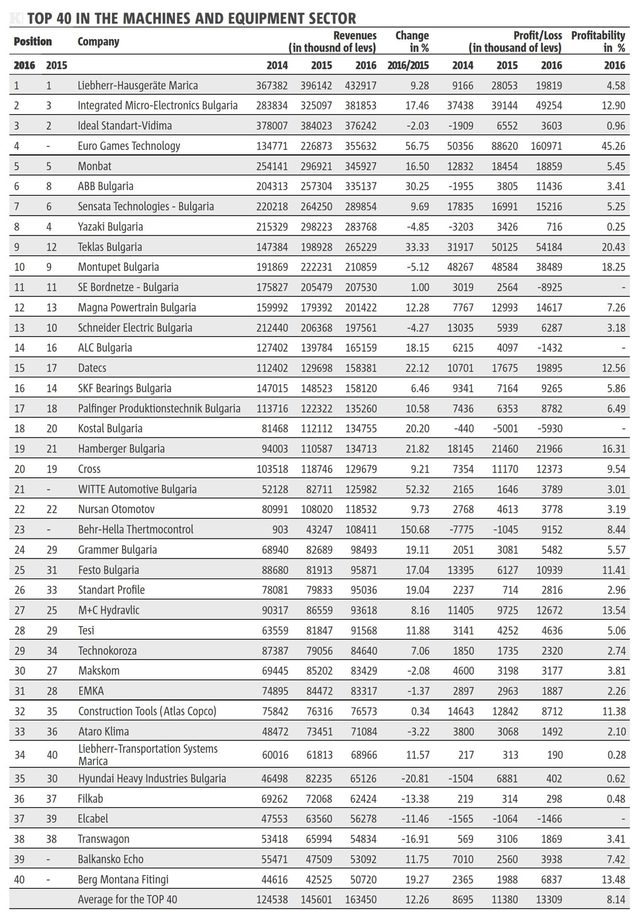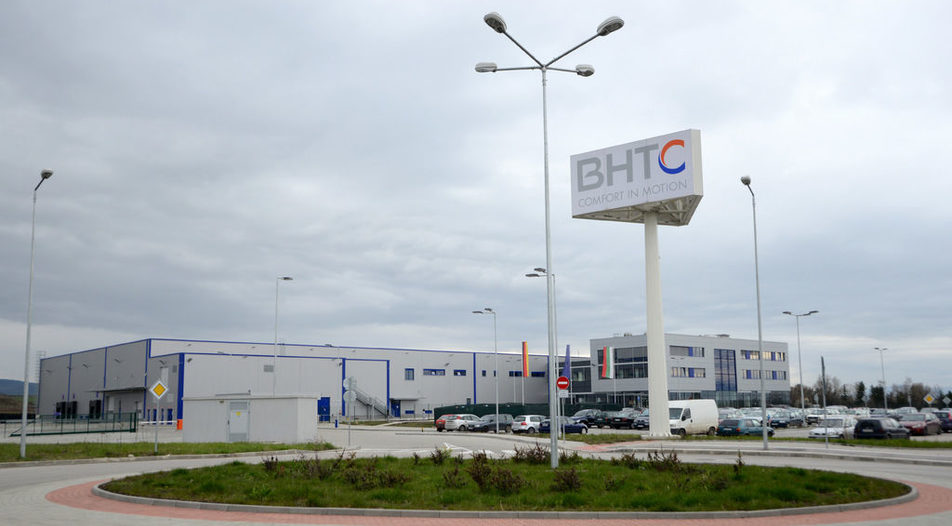• The manufacturers of arms, automobile components and electrical equipment have had a highly successful year.
The manufacturing of machines and equipment is emerging as the latest success story of Bulgaria's economy in terms of revenues and jobs, which is unfolding alongside the robust performance of the IT sector. In 2016, the combined revenues of the first 40 leading companies in the manufacturing sector have increased by over 12% to 6.54 billion levs, exceeding the 6 million levs mark for the first time. The first ten companies account for half of this total.
Overall, the average revenues of the companies from the ranking continued to grow even without taking into account the booming arms production, which is in a separate ranking for 2016. Unlike 2015, a higher number of companies - 11, reported a drop in sales, albeit a small one. While the net average profit margin was 6.8% in the previous ranking, now the profitability of the top 40 companies has increased to 8.14%. The total number of their employees has also increased, to over 42,000, compared to 40,000 a year earlier (again exclusive of the arms manufacturers, which are big employers). On the average, the sector is dominated by foreign investors: two thirds of the manufacturing plants had international owners last year. Another specific feature is that most plants have been built through greenfield investments. Only 11 have been inherited from the Socialist period but almost all of them have been fully renovated and expanded.
The new old leader
Liebherr-Hausgerate Marica, based in Radinovo, near Plovdiv, is the leader for a second straight year. The Bulgarian subsidiary of the German manufacturer of refrigerating equipment continued to increase its revenues, which reached record high 432 million levs last year. The number of employees also increased, reaching nearly 2,000. The business of the group in Bulgaria is even bigger, if we consider the related company Liebherr Transportation Systems Marica, which manufactures heating, ventilation and climate systems for rail cars. Its turnover grew to 69 million levs last year, taking the total revenue of Liebherr in Bulgaria to more than 500 million levs.The long-term leader in the sectoral ranking, Ideal Standard - Vidima, went further down by one position to the third place in 2016. The revenues of the company manufacturing sanitary ware and bathroom fixtures decreased by 2% to 376 million levs, mostly due to the unsteady development of some of the main international markets. However, there are two positive facts about the Sevlievo-based company. First, it reported profit in 2016 after many years of negative results which were due to the servicing of debt of parent company Ideal Standard International (ISI). The second source of optimism is that the three-year investment program of ISI continues - with a large part of it oriented towards the group's business in Bulgaria.
The company that has ousted Ideal Standard - Vidima from the second place is the producer of electronic modules for automobiles, Integrated Micro-Electronics Bulgaria, previously known as EPIQ. In 2016 the Botevgrad-based plant continued to grow fast, increasing its turnover by over 17%. The company's main clients are Volkswagen, Audi, Mercedes-Benz, Renault, Peugeot, Mazda, Toyota, Maserati, Bentley. The company, which is a part of the Philippines-based electronics manufacturer Integrated Microelectronics Inc (IMI), has a very good profitability, of over 12%. According to Eric de Candido, Executive Director of Integrated Micro-Electronics Bulgaria, the company has increased its output by over 25% after the completion of its five-year investment programme. In 2017, the expected revenue growth of IMI Bulgaria is 15%, while staff numbers will reach 3,000.
A new player has emerged among the top companies in the sector, the Bulgarian Euro Games Technology. Set up 14 years ago, the company manufactures equipment and facilities for the gambling industry. It exports its products to Europe, Asia, South America, Central America and Africa and has subsidiaries in Romania, Hungary, Georgia and Ukraine. Its revenues have marked one of the biggest annual growth rates in the ranking, of 57% to 355 million levs. The increase of its profitability is even more impressive, by over 45%. Euro Games Technology has over 1,050 employees and continues to expand. According to data from the Commercial Register, it is owned by three Bulgarian nationals.
Automotive components sector powering ahead
The ranking comprises different companies in terms of size and business segment. As in each of the past five years at least, the sector of machines and equipment is driven forward again by the manufacturers of components and parts for the automotive industry. Fifteen of the top 40 companies in the ranking belong to this segment and account for almost half of the total revenues, or 3 billion levs.Only two of them reported a slight drop in turnover: the company for car cable systems Yazaki Bulgaria and the Ruse-based producer of cast aluminium car parts Montupet, which had to suspend operations on several occasions at the request of the local environmental inspectorate.
However, Yazaki plans to open their third plant in Bulgaria, to be located in Dimitrovgrad. The plant will be among the biggest ones operated by the Japanese company in Europe and will mainly supply parts for Mercedes-Benz cars. At present, Yazaki Bulgaria has over 5,000 employees.
The most profitable company in this group is the Bulgarian subsidiary of Turkey's Teklas, which manufactures fluid circulation systems for motor vehicles. Its profit margin exceeds 20% and its customers include automotive giants like Меrcedes-Benz, BMW and Аudi. Teklas Bulgaria's turnover leapt by 33% in 2016 and an even higher growth is expected in 2017. By the end of 2017 the company will open its fourth plant in Kardzhali, while other production facilities will start operating in Krumovgrad and Momchilgrad already in the summer. The company's most recent customer, US-based Tesla Motors of Elon Musk, has also contributed to the boosting of its image.
There are two new players from the automotive sector in this year's ranking. One of them is Witte Atomotive Bulgaria, the local unit of the German manufacturer of locking systems. The company continued to increase the production of its plant in Ruse and last year it opened a development centre there, which is expected to have a team of 40 experts. They already install innovations for the new Audi A6 and A8 models. Therefore, apart from its manufacturing activity, the company also offers a service with a high added value. The company's turnover has increased by over 50% to exceed 100 million levs for the first time in 2016.
The second newcomer to the ranking is the Bulgarian plant of Germany's Behr-Hella Thermocontrol, which manufactures air conditioning systems for automobiles. The plant in Bozhurishte, on the outskirts of Sofia, supplies components for the premium makes of Audi, BMW and Mercedes-Benz, as well as for cars of many other manufacturers. A year and a half after the Bulgarian plant began operating, its revenues exceeded 108 million levs, up 150% relative to 2015. Following investments of over 60 million levs, the plant is amongst the most state-of-the-art ones in Bulgaria. It also has a development centre with over 50 engineers and specialists working on some of the company's innovative projects.
Excellent examples in many subsectors
This year's ranking shows that companies from different segments of machine building have been developing successfully in Bulgaria. Irrespective of whether they have Bulgarian or foreign owners, they have one thing in common: they export most of their products. An example to this effect is yet another member of the top 40 group, Berg Montana Fittings. This plant for metal fittings for pipes and valves, owned by Spain's Atusa, is the biggest employer in Montana and sells its output across Europe, in the Middle East and North Africa. In 2016 the company reported revenues in excess of 50 million levs and a profit of 6.8 million levs.
Electrical equipment manufacturer ABB Bulgaria, which is a part of Swedish-Swiss engineering giant ABB, also continued to grow its revenues, profit and staff numbers. The group has four plants in Bulgaria, a service station in Varna and an office in Sofia. Two of its production facilities located in Rakovski Zone near Plovdiv, where the company also develops youth training programmes, are the most active recruiters. Those factories reported the highest rate of growth of production, which started back in 2015. ABB Bulgaria's revenues exceeded 335 million levs last year, up 30% compared to 2015.
The Bulgarian manufacturers of bicycles which make successful exports to many countries have been present in the ranking for years. Bulgaria ranked fifth in Europe by the number of manufactured bicycles in 2015, the most recent reporting year of the Confederation of the European Bicycle Industry (CONEBI). The two of the largest companies in the country are Cross and Maxcom with combined profits exceeding 210 million levs. Their combined output totals around 500,000 bicycles per year and it is expected to grow further.
After investing 15 million levs in its plant in Shumen, Bulgarian boiler producer Tesy doubled its annual production capacity to 1.2 million units. Evident from last year's results, the company, which is a part of the Ficosota Holding group of Zhechko and Krassen Kyurkchiev, has increased its revenues to 91 million levs. The company exports to four continents and its market share in Bulgaria is 40%. The company has five production plants: three in Shumen and two in Smyadovo, employing around 750 people.
Following a decline in 2015, Festo Proizvodstvo, the Bulgarian subsidiary of the German group for industrial automation Festo, recorded a turnover of 96 million levs in 2016, up 17% year-on-year. According to Festo Proizvodstvo manager Georgi Atanassov, the growth is due to the 26% rise in the output of magnetic and other types of sensors. One of Festo's five technological centres carrying out development and engineering activities is also based in Sofia. The company keeps extending its plant with the next stage of a large-scale expansion expected to begin in 2018.
The revenues of Datex, a manufacturer of cash registers and mobile payment systems, have also grown considerably, by 22% to 158 million levs. The company attributes the growth to increased output resulting from investments in new production lines. Production is expected to increase by a further 5% during the current year. The company exports around 80% of its devices with the U.S., Kazakhstan, Great Britain and Germany its main markets. The number of employees Datex has also increased, exceeding 400.
A similar growth rate, of over 21%, has been reported by the Bulgarian unit of Germany's Hamberger, the biggest manufacturer of WC seats in Europe. During the past year, Sevlievo-based Hamberger Bulgaria began investing in expansion of its line of business towards production of wooden parquet flooring and construction of a logistics center. The overall investment in the project is around 30 million levs, with the effect expected to be felt this year. Hamberger Bulgaria has a total of some 1,000 employees, of whom 150 are involved in parquet production. The rise in 2016 revenue was due to increased exports. Initially, the company's main customer was its neighbour next door in Sevlievo, ceramic sanitary ware manufacturer Ideal Standart - Vidima, but now it has other clients as well. Around 96% of Hamberger Bulgaria's output is exported.

• The manufacturers of arms, automobile components and electrical equipment have had a highly successful year.
The manufacturing of machines and equipment is emerging as the latest success story of Bulgaria's economy in terms of revenues and jobs, which is unfolding alongside the robust performance of the IT sector. In 2016, the combined revenues of the first 40 leading companies in the manufacturing sector have increased by over 12% to 6.54 billion levs, exceeding the 6 million levs mark for the first time. The first ten companies account for half of this total.












